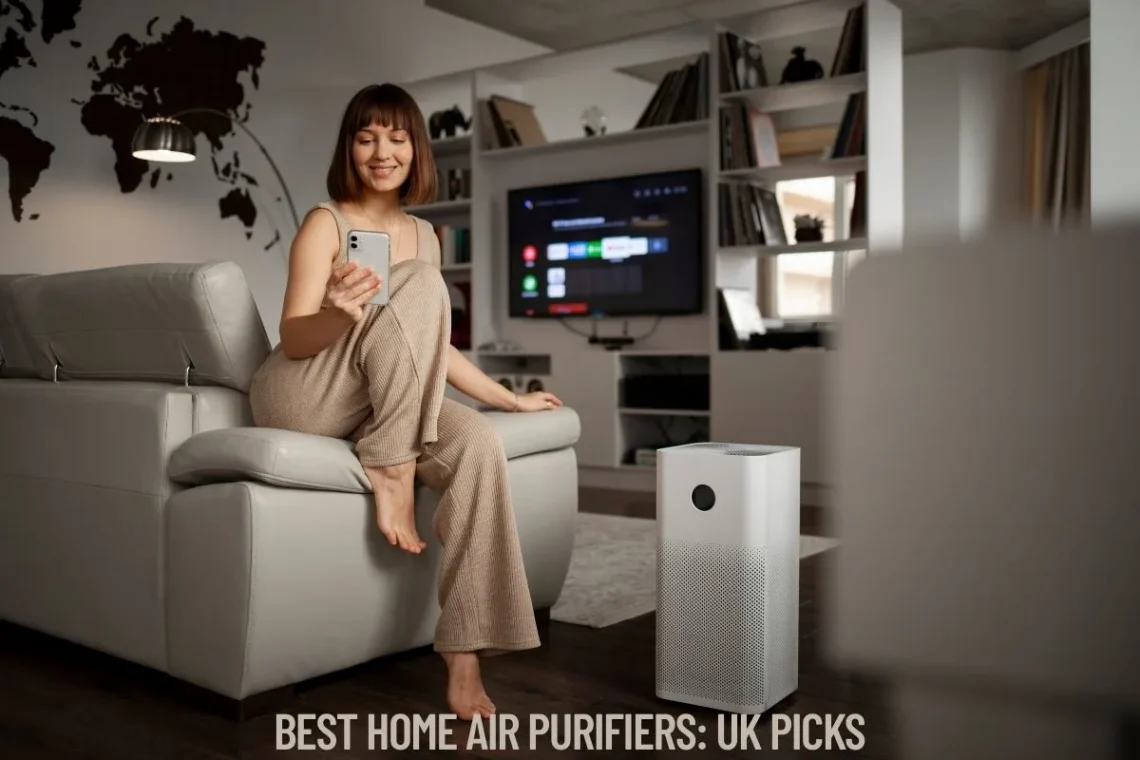
Best Home Air Purifiers: UK Picks
Breathing clean indoor air is something we often take for granted—until dust, allergens, or pollution start bothering our noses and lungs. In the UK, where many homes face issues like pollen in spring, dust mites, and even damp-related mould, having a good air purifier can be a game-changer. But with so many options, which air purifiers are truly the best for UK homes? This friendly, easy guide breaks down everything you need to know about choosing, using, and trusting air purifiers to keep your home’s air fresh and healthy.
Along the way, I’ll give you handy tips, share personal experiences, and highlight what hundreds of UK customers have loved about their purifiers.
Table of Contents
ToggleWhy Buy a Home Air Purifier in the UK?
UK homes face unique air quality challenges:
-
Seasonal pollen and hay fever: Spring is beautiful, but tough for allergy sufferers.
-
Dust and pet dander: Even homes that look clean may have invisible allergens floating around.
-
Indoor mould spores: Caused by dampness common in some UK climates, mould can worsen respiratory symptoms.
-
Urban pollution: In cities, air pollution sometimes enters homes through windows and doors.
-
And now COVID-19 awareness: More people care about airflow and air cleanliness.
I remember the first spring after buying an air purifier for my mum’s flat in London. Her sneezing and coughing dropped dramatically once it started humming in the background—simple but effective.
Which Air Purifier Is Best for the Home in the UK?
There’s no one-size-fits-all, but here’s how to pick a purifier right for your needs:
1. Room Size Compatibility
Know the size of the room where you’ll use the purifier. Most brands list the maximum square footage for each model. For example, a purifier rated for 300 sq ft is great for bedrooms or small lounges.
2. Filter Type
-
HEPA Filters are the gold standard. They capture 99.97% of particles down to 0.3 microns, including pollen, dust, and pet allergens.
-
Activated Carbon Filters help remove odors and VOCs (volatile organic compounds).
-
Some models add UV light or ionizers for extra sterilization, but these vary in effectiveness.
3. Noise Level
In bedrooms or offices, a quieter purifier is essential. Look for models rated under 50 decibels.
4. Energy Efficiency
Since purifiers often run for hours daily, energy-efficient models reduce electricity bills and environmental impact.
5. Ease of Maintenance
Consider how often filters need changing and how easy it is to buy replacements.
Popular UK Picks:
-
Dyson Pure Cool Me: Sleek design, good for medium rooms, includes HEPA and activated carbon filters.
-
Levoit Core 300: Budget-friendly, strong HEPA filtration, whisper-quiet operation.
-
Philips Series 2000: Excellent allergen removal, smart sensors, and washable pre-filters.
-
Blueair Blue Pure 211+: Covers up to 540 sq ft, great for large living rooms, simple controls.
What Is the Most Effective Home Air Purifier?
Effectiveness depends on several factors:
-
True HEPA filtration: It captures tiny airborne particles.
-
CADR ratings: Higher Clean Air Delivery Rates mean more efficient cleaning in less time.
-
Continuous air circulation: The purifier’s fan speed and design should be able to cycle room air multiple times an hour.
As an insight, a purifier moving air at least 4–5 times per hour is considered ideal.
Do Air Purifiers Work in the UK?
Yes, but with conditions:
-
Proper sizing: A tiny purifier in a huge room won’t help.
-
Regular use: Air purifiers are most helpful when running for several hours a day.
-
Maintenance: Changing filters on time keeps performance high.
-
Good source control: Purifiers help reduce particles but can’t fix methane leaks or smoke—address sources first!
How to Use Your Air Purifier for Best Results
-
Place it centrally in the room, away from walls or furniture, for good airflow.
-
Keep windows and doors closed if possible, especially in high pollution times.
-
Run the purifier continuously during allergy season or when someone is ill.
-
Regularly check and change filters as recommended.
-
Use purifier settings smartly—higher fan speeds during peak pollution or cooking, lower at night.
Personal Experience: Life After Getting an Air Purifier
When my family installed an air purifier in our open-plan living room, we noticed fewer sneezes and better sleep quality. My dad, who suffers from mild asthma, said the difference was noticeable. It wasn’t magic, but consistent care made our air healthier—especially during London’s busy pollen months.
Safety Tips When Using Air Purifiers
-
Avoid purifiers that produce ozone. Some ionizers produce harmful ozone, which can worsen lung conditions.
-
Use genuine, certified HEPA filters for legitimate air cleaning.
-
Keep purifiers away from children and pets to prevent accidents.
-
Regular cleaning of purifier surfaces prevents dust build-up.
Cost Comparison: Top Home Air Purifiers in the UK
| Model | Price (GBP) | Room Size Coverage | Filter Replacement Cost | Noise Level (dB) |
|---|---|---|---|---|
| Dyson Pure Cool Me | £299 – £350 | Up to 100 sq.ft | £30 – £50 every 6-12 months | 40 – 60 |
| Levoit Core 300 | £85 – £120 | Up to 219 sq.ft | £20 – £30 every 6 months | 25 – 50 |
| Philips Series 2000 | £150 – £230 | Up to 145 sq.ft | £40 – £60 every 12 months | 32 – 50 |
| Blueair Blue Pure 211+ | £250 – £350 | Up to 540 sq.ft | £50 – £60 every 6-12 months | 31 – 50 |
Frequently Asked Questions About Air Purifiers in the UK
Q: Are air purifiers worth it for small apartments?
A: Yes, as long as you choose the right size purifier for your room.
Q: Can air purifiers remove COVID-19?
A: While no purifier guarantees 100% removal, HEPA filters can reduce airborne particles, including viruses.
Q: How often should I replace air purifier filters?
A: Typically every 6 to 12 months, but check your model’s instructions.
Q: Can I use essential oils with my air purifier?
A: Most purifiers aren’t designed for oils—it’s best to avoid adding oils directly to prevent damage.
Final Thoughts
Home air purifiers have become essential for healthier living in the UK, especially for allergy sufferers and city dwellers. Picking the right model, running it consistently, and maintaining it properly can significantly improve indoor air quality and your well-being.
If you want a quick checklist or guide for choosing and using air purifiers tailored for UK homes, I’m happy to help create that next!
Breathe easy and enjoy fresher, cleaner air every day.

Best Energy-Saving Home Heaters 2025
You May Also Like

A Homeowner’s Guide on Choosing Dog-Friendly Fabrics and Furniture
November 4, 2025
Understanding Lamona Oven Symbols: Insights from Certified Appliance Technicians
July 21, 2025
